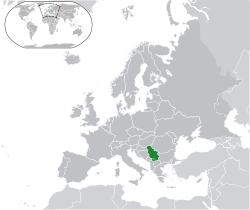Serbian Prosecutors Interview Tycoon Miskovic
By Bojana Barlovac
As Organized Crime Prosecutors on Thursday questioned the Delta Holding boss, Miroslav Miskovic, the Justice Minister says the state is finally taking a stand against crime.
Prosecutors started questioning Miskovic on Thursday afternoon after which a decision was to be made on continuing his detention.

Police arrested him on Wednesday along with nine other persons on suspicion of abuses during the privatization of road construction and maintenance companies.
The suspects include his son, Marko, owner of Mera Investment Fund, and Marko Djuraskovic, owner of the road building company Nibens Group.
Djuraskovic and Marko Miskovic were also questioned on Thursday.
Once all the suspects had been interviewed, the Prosecutor’s office would decide on possible detention of up to 30 days.
Organized Crime Prosecutor Miljko Radisavljevic said on Wednesday that the investigation into Miskovic’s business operations was not over and a thorough financial probe was underway.
Radisavljevic said an investigation may last for some time given the size and complexity of Delta’s operations.
Miroslav and Marko Miskovic are suspected of having illegally obtained more that 30 million euro.
All the suspects have been arrested for abuse of office for which they may face prison sentences of two to 12 years.
Nikola Selakovic, Serbian Justice Minister, said that “the unthinkable has happened in Serbia.
“The state has stood up to defend the law,” Selakovic added, noting the importance of the cooperation between police and the prosecution in the case.
Milka Forcan, former vice president of Delta Holding, said the arrest would likely affect the company’s image as well as its business dealings.
“I do not agree with scenarios that it will all collapse like a house of cards,” she told the broadcaster B92.
Serbia’s new government has pledged to root out corruption, which is often cited in EU reports as one of the biggest problems facing the Balkan country.
Aleksandar Vucic, Serbia’s Deputy Prime Minister, in charge of corruption, and leader of the ruling Serbian Progressive Party, said the group was arrested in relation to 24 privatizations cases that the EU has flagged up as problematic.
“Two things have been proven in Serbia – that nobody is protected and untouchable and that the state is stronger than any individual,” Vucic said on Wednesday.
Delta Holding’s owner was first questioned by police on December 3. Djuraskovic was questioned the same day.
Marko Miskovic was questioned on Friday about his company’s cooperation with Nibens Group.
Born on July 5, 1945, Miskovic grew up in the central Serbian town of Krusevac and graduated in economics from Belgrade University in 1971.
He briefly entered politics in 1990 as Deputy Prime Minister in the era of Slobodan Milosevic but left after less than six months to start Delta M company, which became very successful in the following years.
In 2007, Forbes Magazine named Miskovic as the richest man in Serbia with a fortune estimated at about €1 billion.
Delta Holding, which includes land, a major stake in the Port of Belgrade, shopping centres and automobile dealerships, employs thousands of people, making it the largest non-government employer in the country.
The company also operates in Bulgaria, Bosnia, Macedonia and Cyprus.
Investigations into Delta, and allegations of monopolies controlled by Miskovic, have made headlines over the past decade, but no action has previously been taken.
